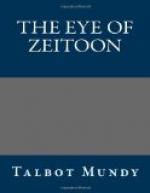“Probably Kagig ’ud skin them if they turned up without us,” remarked Will.
There was something in that theory, for we learned later what Kagig’s ferocity could be when driven hard enough. But from first to last those men of Zeitoon never showed a symptom of treachery, although their resentment at having to turn their backs toward home appeared to deepen hourly.
With strange unreason they made no haste, whereas we were in a frenzy of impatience; and when Fred sought to improve their temper by singing the songs that had hitherto acted like charms on Kagig’s whole command, they turned in their saddles and cursed him for calling attention to us.
“Inch goozek?” demanded one of them (What would you like?), and with a gesture that made the blood run cold he suggested the choice between hanging and disembowelment.
Will solved the speed problem by striving to push past them along the narrow track; and they were so determined to keep in front of us that within half an hour from the start our horses were sweating freely. Then we began to climb, dismounting presently to lead our horses, and all notions of speed went the way of other vanity.
Several times looking back toward our right hand we caught sight of Kagig’s string threading its way over a rise, or passing like a line of ants under the brow of a gravel bank. But they were too far away to discern which of the moving specks might be Monty, although Kagig was now and then unmistakable, his air of authority growing on him and distinguishing him as long as he kept in sight.
We saw nothing of the footprints in soft earth that Maga had read so offhandedly. In fact we took another way, less cluttered up with roots and bushes, that led not straight, but persistently toward an up-towering crag like an eye-tooth. Below it was thick forest, shaped like a shovel beard, and the crag stuck above the beard like an old man’s last tooth.
But mountains have a discouraging way of folding and refolding so that the air-line from point to point bears no relation to the length of the trail. The last kites were drooping lazily toward their perches for the night when we drew near the edge of the forest at last, and were suddenly brought to a halt by a challenge from overhead. We could see nobody. Only a hoarse voice warned us that it was death to advance another yard, and our tired animals needed no persuasion to stand still.
There, under a protruding lock as it were of the beard, we waited in shadow while an invisible somebody, whose rifle scraped rather noisily against a branch, eyed every inch of us at his leisure.
“Who are you?” he demanded at last in Armenian, and one of our three men enlightened him in long-drawn detail.
The explanation did not satisfy. We were told to remain exactly where we were until somebody else was fetched. After twenty minutes, when it was already pitch-dark, we heard the breaking of twigs, and low voices as three or four men descended together among the trees. Then we were examined again from close quarters in the dark, and there are few less agreeable sensations. The goose-flesh rises and the clammy cold sweat takes all the comfort out of waning courage.




